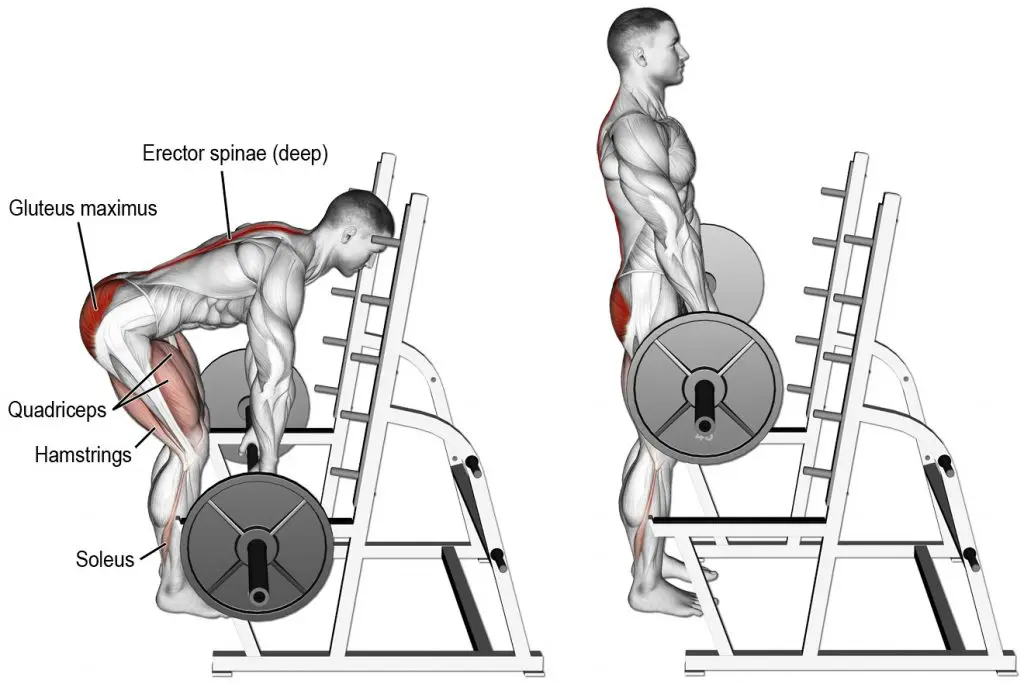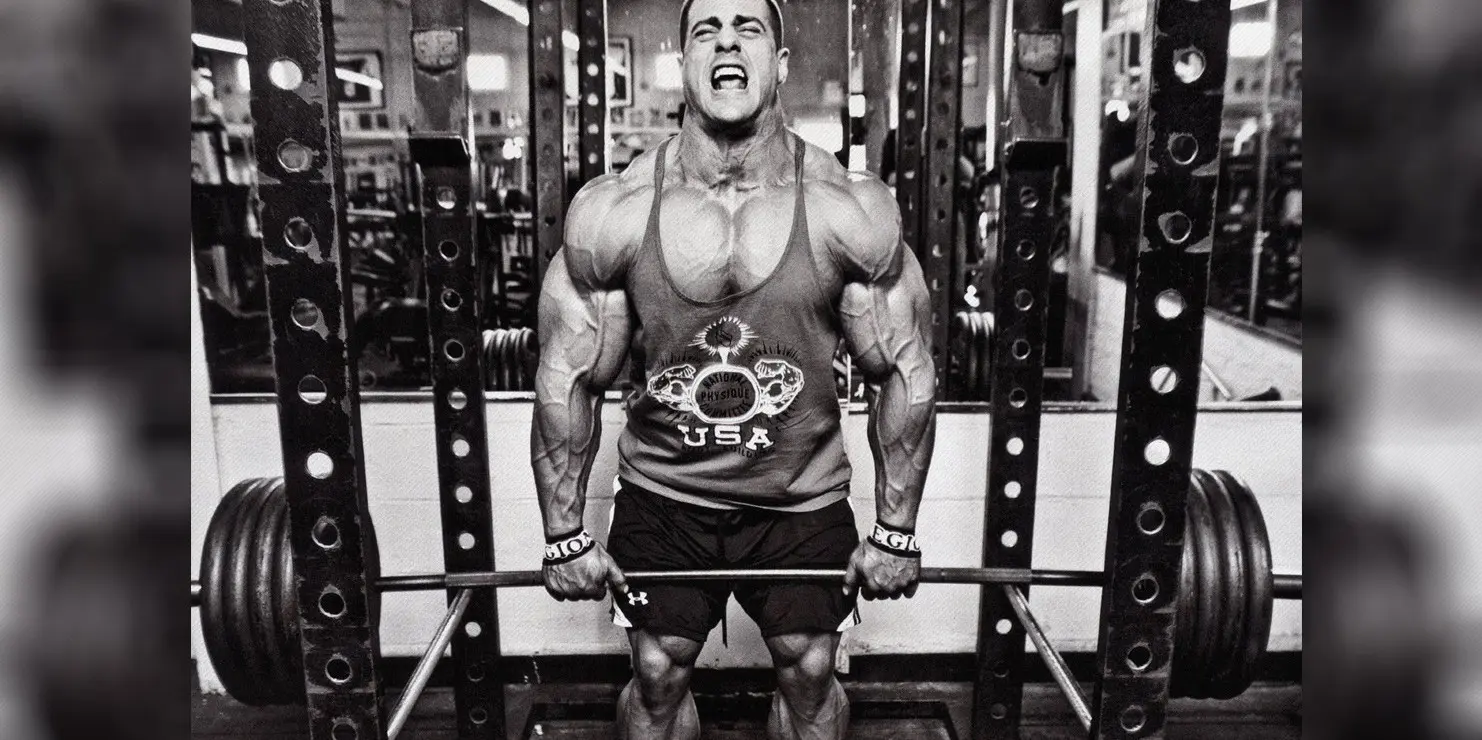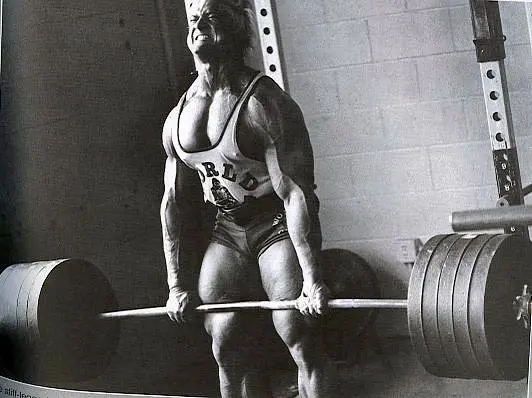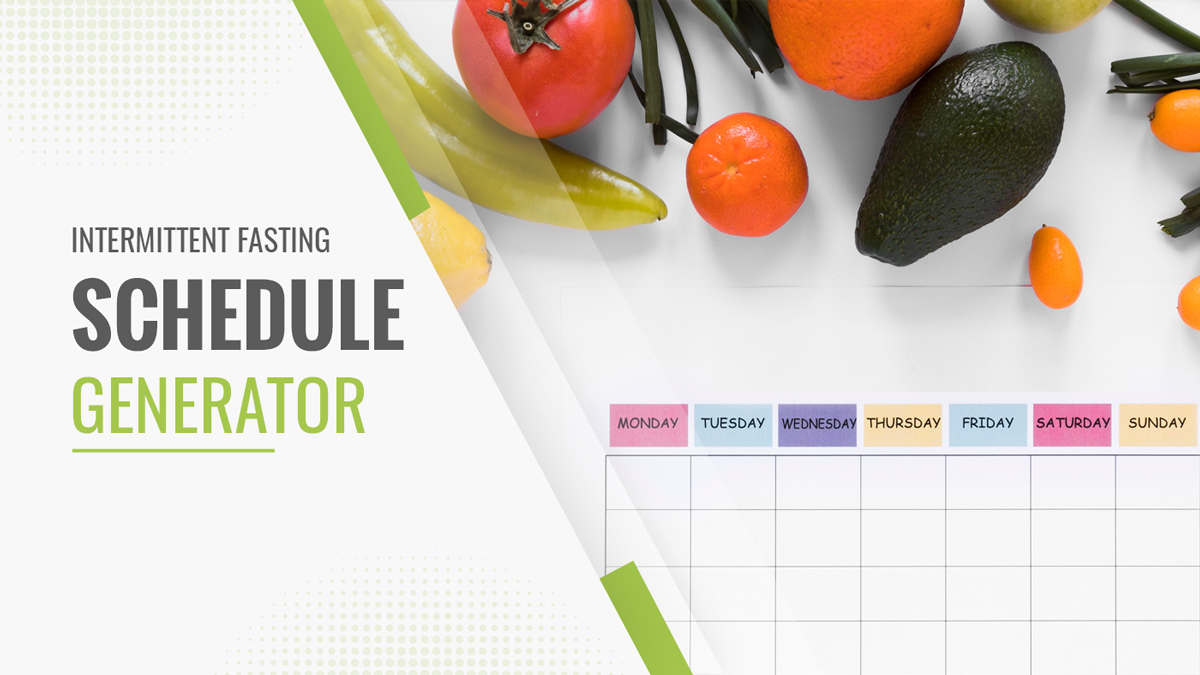Rack Pulls is the perfect exercise for enhancing your pulling strength, developing your back and hips, and working your way towards an improved deadlifting technique!
Rack pulls are essentially a variation on the deadlift in which you focus on the upper portion of the lift. Even though there is a much shorter range of motion involved when compared to the conventional deadlift, the power of rack pulls for back development is truly undeniable.
If you’re looking to gain size in your back, then this particular exercise will be hugely beneficial. Soon enough, you’ll have mastered the top half of the deadlift movement – providing a good base for you to execute conventional deadlifts more effectively.
So, without any further ado, it’s time for you to find out more about rack pulls. Along the way, you’ll discover how they can help you build strength and power in your back. Continue reading for our complete guide to rack pulls.
How To Do Rack Pulls
As with any other exercise in the gym, you’ll need to focus on perfecting your form when you execute the rack pull movement. If you do exactly that, then you will be able to make the most out of the exercise, while helping you to avoid injury.

- Set up the height of your rack depending on which muscle group you’d like to focus on. A lower bar position means that you’ll involve more glute and hamstring action. Conversely, a higher starting point increases the focus on your back.
- Face your palms towards you, and place your hands shoulder-width apart. Then, grasp the bar which is placed in your chosen starting position. Engage more hamstring action by pushing your hips back.
- Keep your back straight and lift the bar from the starting position. You do this by driving your hips forward and straightening your knees.
- Once you’ve reached the top of the movement, simply pull your shoulders back, then slowly lower the bar down. Repeat this movement for your chosen number of reps for each set.
Here is how to do Rack Pull properly:
Which Muscles Do Rack Pulls Work?
The benefits of rack pull is that they work more than one muscle group at once. In the following section, you will discover the primary muscle groups which are worked as you execute the move.
Hamstrings
While the hamstrings are not involved heavily within the rack pull exercise, there is a way in which you can activate them more. All that you need to do is adjust your starting point so that it is in a lower position. If you do just that, then you can expect improved strength in your hamstrings over time.
Quadriceps
The quads are slightly engaged throughout the rack pull movement. Although, as the bar is set above the ground, it can be said that their involvement is limited. In order to activate your quadriceps more, you will need to place the bar’s starting point to a lower position. Over time, you will be able to feel the benefit in the quads.
Glutes
The glutes are targeted massively during the rack pull movement. This is due to the limited range of motion which is involved in the exercise. The heavy amount of weight which you are able to lift with rack pulls is also beneficial for glute development. Eventually, this will allow you to enjoy the improved performance with your deadlifts.
Lower Back Muscles
Less hip flexion is needed with rack pulls when compared to conventional deadlifts. This is due to the reduced range of motion which is involved in the movement. So, if you have your sights set on a stronger lower back, rack pulls will go a long way.
Trapezius Muscles
Rack pulls are a hugely effective exercise when it comes to the development of this muscle group. This is all down to the heavy amount of weight which you are able to lift with the move. In turn, this helps to overload the upper back and trap muscles.
What Are The Benefits of Rack Pulls?
When it comes to rack pulls, it is safe to say that this particular exercise is beneficial in more ways than one. Increased pulling strength is one of the most notable benefits of rack pulls.
Essentially, this means that you will be able to perform better on exercises which involve pulling movements. This includes the likes of the deadlift, which requires optimal glute, trapezius, and back strength to perform correctly.
Trapezius and back development is also possible with rack pulls – all thanks to the heavy amount of weight you can lift as opposed to conventional deadlifts. This means that rack pulls are a great option for anyone who is looking to increase size and strength in their traps.
Who Will Benefit From Rack Pulls?
For powerlifters, strongman athletes, crossfitters, and competitive weightlifters, rack pulls are undoubtedly useful. By performing this exercise on a regular basis, the posterior chain will be strengthened, grip and pulling strength will be enhanced, and you will be able to develop your trapezius and back muscles. In turn, this means improved lifting technique in other pulling exercises such as the deadlift.
Formal sports athletes will also benefit from rack pulls too. This is because the exercise leads to an increase in muscle mass and overall strength. Over time, this will allow you to perform better in many different exercises in the gym – particularly ones which involve the posterior chain.
In addition to this, you’ll also find that rack pulls are great for general fitness. This is because the movement allows you to increase your upper back strength, develop your glutes, and improve the upper portion of your deadlifting technique.
However, most people will find that exercises which involve a full range of motion are a far more effective choice. This includes the regular deadlift, or sumo deadlift – both of which target multiple muscle groups and lead to a huge increase in muscle mass over time with progressive overload.
Recommended Reps and Sets
Depending on your particular fitness goals, the number of reps and sets you perform can be adjusted accordingly. For example, those who are focusing on muscle hypertrophy will gain maximum benefits with a rep range of 6-10 for 3-5 sets.
If your goal is to increase muscle strength, then it is highly recommended that you stick to a low rep range. Typically, between 3-5 reps per set should be more than adequate. But, just ensure that you lift a heavy yet manageable weight. This will allow you to gradually increase the weight you lift while avoiding any potential injuries.
Either way, rack pulls are fantastic exercise to get you used to the deadlifting movement. Once you’ve mastered this particular move, gradually lowering the starting position of the bar will eventually allow you to progress onto full deadlifts from the ground.
Rack Pulls Variations
When it comes to rack pulls, there are a few different variations which you can try to mix things up a little. For example, the reverse band rack pull is great for increasing your confidence and grip strength by overloading the movement.
Another variation of rack pulls which is great for improving your grip strength is using a fat bar. Essentially, this increases the diameter of the barbell which makes the move more difficult. So, this is a fantastic option for those who are looking for more of a challenge.
Conclusion
So, there you have it! that concludes the ultimate guide to rack pulls! It is clear to see that you can enjoy serious back development with this particular exercise.
As always, progressive overload and perfect form are the two most important aspects of training that you need to focus on. If you do just that, then supreme back muscle gains are exactly what you can expect!
Tip: If you're signed in to Google, tap Follow.











awesome article. i love rack pulls.